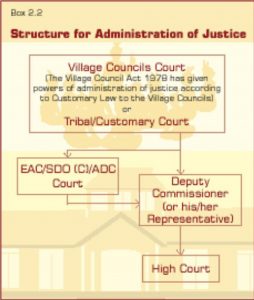3.3. Gaon Buras and Dobashis
Gaon Buras (GBs) – meaning ‘village elders’ in the Assamese language of Assam – are village elders nominated by the Village Councils and authorized by the Government to act as assistants to the Deputy Commissioners in village administration. Gaon buras are generally charged with responsibility of good behaviour (read as ensuring law and order) in their villages/clan/locality, as well as, being the spokesmen of their community. The number of gaon buras in a village depends on the total population and number of localities or khels. Gaon Buras are now an integral part of the governance and administrative system of the villages. They are usually selected by the clan or khel and the Village Councils forwards the names to the government for approval and therefore are considered as agents of the government. This is because gaon buras are appointed by law of the state government and not by the traditional institutions themselves.
“Dobasha” or “Dobashi” means ‘two languages’. The post of dobashi was created by the British to act as translators between them and the local populace. They were individuals knowledgeable about customary laws and appointed by the government to advise the officers in the settlement of cases.
Box V: The Dobashi Institution
Dobashi’ as a unique institution of Nagaland were originally founded by the British to help them in their administration of Naga territories. Because of its practical usefulness, the institution of Dobashis is being continued till today
Originally the appointment of a dobashi was for the plain purpose of translation or interpretation of language, but slowly the dobashis were given the significant role of not only as interpreters of languages, but as interpreters of rules and regulations. They became deliverer of justice, or judgments in many disputes. The “dobashi method” of settling disputes is better in many ways, as compared to the system adopted in formal law courts. In formal law courts, decisions are taken on the basis of better evidences and arguments, whereas, such system, in the ‘dobashi system’ matters are settled by objectively looking at the issue and decisions or judgments arrived at through consensus like in Village Courts or based on traditional precedence.
The strength of the dobashis in Nagaland is now over 2000 and is rightly acknowledged as the ‘backbone of district administration’. Every district has Dobashis Court, which deal mainly with customary laws and its implementation. As Assistant to Deputy Commissioners, the dobashis, are playing very important role in delivering of justice in the Naga society.
Adapted from letter of Mr Nephiu Rio, Chief Minister of Nagaland to the General Conference of Nagaland Dobashi Association. 21st January 2009
4. Administration of law and justice
All Naga tribes or for that matter even villages have their respective laws and norms to deal with civil as well as criminal cases. ‘Naga customary law and procedure’ is protected by the special Constitutional provisions of Article 371A9 and these are further upheld in the Nagaland Village Councils Act and related laws passed by the state government. The proclivity to settle most of the cases through the traditional justice system and its acceptability to the people ensure speedy redressal of grievances and significantly lesser extent of litigation.10 Within each village, it is the Village Councils which enforce the customary laws and procedure as part of their governance and administrative functions. With the standardization of the system
9 See Box II
10Nagaland State Human Development Rep ort. October 2004. Department of Planning and Coordination. Government of Nagaland. Kohima, Nagaland.
through enactment of the Nagaland Village Councils Act, Village Councils amongst others also include government appointed Gaonburas (GBs) who are accorded prior approval by the Village Council or the Putu Menden.
Box IV: Structure of Administration of Justice in Nagaland11




 The last Konyak headhunters of Nagaland
The last Konyak headhunters of Nagaland Meet R.N. Ravi, who is mediating peace with the Nagas
Meet R.N. Ravi, who is mediating peace with the Nagas The Top Viral YouTube Videos of 2017
The Top Viral YouTube Videos of 2017 What Does Your Face Say About Your Health?
What Does Your Face Say About Your Health?










Leave a Reply
Your email address will not be published. Required fields are marked (required)